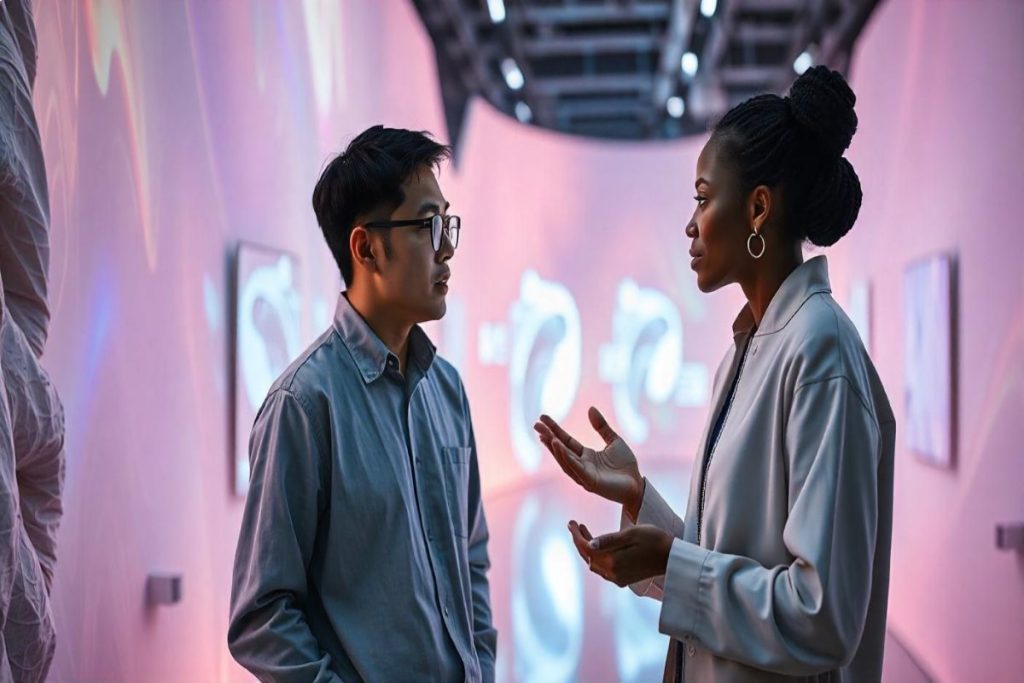The intersection of humanities and artificial intelligence brings forth compelling questions about the future of humanities education and the evolving landscapes of universities. As AI continues to reshape our daily lives, we must consider the profound impact of AI on the humanities, including its implications for traditional liberal arts disciplines. In an age where AI’s capabilities are rapidly expanding, educators and students alike grapple with the AI effects on universities, prompting urgent discussions on how to preserve the essence of humanities in the face of technological advancement. The challenge lies not only in adapting curricula but also in ensuring that the core values of humanistic inquiry remain intact. Without adapting, we risk losing sight of the fundamental questions that define what it means to be human—how to live, connect, and create meaning.
At the crossroads of arts and intelligent technology, the dialogue surrounding culture and machine learning has never been more pertinent. This emerging conversation revolves around the implications of machine intelligence on our understanding of the human experience, particularly within the realm of creative disciplines. As universities navigate the transformative effects of AI on liberal arts programs, educators are increasingly prompted to redefine what it means to teach and learn in this context. The deployment of AI tools in humanities courses could unlock new forms of insight and expression, raising thought-provoking questions about originality and interpretation. In this digital age, the essence of the humanities is being reexamined through the lens of artificial intelligence, challenging us to rethink and reinforce the role of humanistic study in a technologically-driven future.
The Impact of AI on the Humanities: A Paradigm Shift
The emergence of artificial intelligence (AI) brings both challenges and opportunities to the humanities. As AI systems increasingly dominate fields previously considered exclusive to human intellect, such as research and creation in literature and art, there is a vital discourse about what this means for our understanding of culture and historical consciousness. AI’s capabilities in generating text or analyzing historical artifacts can seem intimidating; it raises the question of whether traditional humanities disciplines can maintain their relevance in the face of algorithms that can produce similar outputs with incredible speed. This shift challenges educators and scholars to rethink the very foundation of humanities studies, moving beyond rote knowledge accumulation towards fostering critical thinking and deeper engagement.
However, the rise of AI also offers a transformative opportunity for the humanities. In this new landscape, humanists are prompted to focus more on the experiential aspects of learning, rediscovering their core objective: understanding what it means to be human. Rather than replacing the rich, subjective insights that come from human experience, AI can act as a tool to enhance our explorations of philosophical, literary, and cultural questions. Such integration encourages educators to inspire students to engage with historical texts and artifacts in innovative ways while leveraging technology to broaden access to complex ideas and promote inclusivity within the classroom.
The Future of Humanities Education in an AI-Driven World
With AI poised to redefine academia, the future of humanities education must adapt to these technological advancements or risk obsolescence. Educators face the critical task of designing curricula that embrace AI tools, incorporating them as part of the learning journey rather than as adversaries. Courses that encourage students to utilize AI in interpreting texts or developing creative projects can stimulate engagement while reinforcing the importance of human insight and ethical considerations. By reimagining expressions of scholarship, educators can foster a new generation of thinkers capable of navigating the complexities of an AI-infused world.
Moreover, as AI continues to evolve, humanities programs should focus on developing soft skills like critical thinking, creativity, and emotional intelligence—areas where machines still struggle. These human-centric proficiencies are essential for students who will increasingly work alongside AI technologies. Hence, the goal of humanities education should not only be to educate students about cultural artifacts but also to empower them with the emotional and intellectual tools necessary to discern and navigate an algorithm-driven society.
AI Effects on Universities: Redefining Academic Structures
Universities must navigate the implications of AI’s influence on teaching, learning, and institutional structures. The widespread adoption of AI technologies can lead to fundamental changes in how academic programs are delivered, with online modalities that enhance accessibility and allow for flexible learning experiences. Students can benefit from personalized education through AI-driven platforms that adapt to their unique learning needs, potentially increasing retention and fostering a more inclusive atmosphere. However, university leaders must also address the challenges associated with these changes, including staff concerns about job security and the evolving nature of scholarly contributions.
Furthermore, integrating AI within academia urges a reevaluation of research methodologies. As AI streamlines vast data analysis, what constitutes a valid study, and how should findings be disseminated? Universities will need to cultivate interdisciplinary collaborations that juxtapose technological prowess with humanistic inquiry, ensuring that ethical implications of AI are at the forefront. In recognizing and embracing the potentialities of AI, academic institutions can evolve toward a more innovative and inclusive future that does not diminish the richness of the humanities but celebrates and revitalizes its role.
Humanities in the Age of AI: Embracing New Possibilities
In the age of AI, the humanities find themselves at a crossroads, where traditional boundaries between humans and technology blur, leading to an era of unprecedented potential. The application of generative AI in humanities scholarship can produce new insights, engage in creative processes, and renew anthropological inquiries into human existence. The ability to analyze texts efficiently and generate own context-aware narratives provides scholars an array of tools for pedagogy and research, promoting innovative discussions that could reshape how we understand our past and present.
However, embracing these tools does not mean relinquishing our unique human perspectives. The emphasis should be on the contrasting capacities that humanists bring to the table: empathy, introspection, and value judgment. AI may excel in data processing, but it cannot replicate the deep introspection and ethical reasoning that emerge from humanistic study. As we embark on this journey, we must remain vigilant to ensure that these advancements bolster the exploration of human experience rather than reduce it to mere data points.
AI and Liberal Arts: A New Educational Landscape
The advent of AI presents an opportunity to revitalizing the liberal arts. With AI tools assisting in the analysis of literature, philosophy, and culture, the liberal arts can expand their reach and relevance in a world where interdisciplinary approaches are increasingly valued. By integrating AI into liberal arts curricula, students can experience a unique blend of technological fluency and cultural competency, preparing them for a workforce that demands adaptive and versatile skill sets. This alignment can foster critical examination of society’s trends while still encouraging creativity and self-expression.
Moreover, the collaboration between the sciences and the liberal arts can promote a more holistic educational experience. For instance, students might explore the ethical implications of AI software in literature or the role of technology in historical contexts, blending analytical skills with creativity. This intermingling can encourage students to view problems from diverse angles and develop comprehensive solutions. Emphasizing the liberal arts in tandem with AI technology invites deeper discussions about culture, history, and humanity’s various narratives while fostering ethical and critical perspectives in future leaders.
Navigating Ethical Considerations in AI and Humanities
As AI technologies evolve, ethical considerations must be a central theme in the dialogue around their use within the humanities. The ability for AI to autonomously generate content prompts serious questions about authorship, authenticity, and the broader implications about knowledge creation. It challenges traditional notions of what it means to be an author or a creator within the field of humanities. With the capacity for software to produce articles, analyses, and even artistic works, educators must bring awareness to these issues, fostering discussions on intellectual property and the moral responsibilities that accompany AI use.
Moreover, it’s vital to cultivate digital literacy among students, so they understand both the intricacies and the limitations of AI technologies in humanities research. Engaging students in critical discourse on the ethical use of AI can empower them to think critically about the ramifications of technology’s encroachment into humanistic realms. By confronting these challenges head-on, we can help students carve out their agency in a complex landscape where the interplay of intelligence—human and artificial—frames their understanding and practice in the humanities.
The Role of Critical Thinking in AI and Humanities Education
The emergence of AI tools in academia necessitates a renewed emphasis on critical thinking within humanities education. As students encounter AI technologies that can process data and generate content efficiently, the essence of education should shift from knowledge acquisition to understanding how to evaluate, interpret, and analyze information. Encouraging students to scrutinize the quality and biases inherent in AI outputs fosters an educational environment where deeper engagement with texts and ideas is prioritized,
Furthermore, cultivating critical thinking enables students to confront society’s growing issues influenced by AI, such as surveillance, ethics, and democracy. In this light, the study of the humanities can become a compass for navigating the future by fostering a generation that can critically assess the intersection of technology and human experience. Encouraging these conversations ensures that students grow into informed citizens who can navigate AI’s complexity with discernment and sensitivity.
Reimagining Understanding: The Humanities’ Role in the AI Era
As the dialogue surrounding AI’s impact on society progresses, the humanities are at a pivotal moment where their traditional insight into the human condition must evolve. The confrontation with rapidly advancing artificial intelligence services compels educators and scholars to reimagine their roles. They must endeavor to provide students with the tools to grapple with profound questions about identity, existence, and morality, which remain essential in the face of technological advances. It is through this lens that we can appreciate the humanities as not merely reflective, but as proactive agents that shape ethical considerations surrounding AI deployments.
Moreover, reimagining the humanities in the context of AI helps realize the discipline’s potential to address fundamental human concerns that AI algorithms cannot. Humanities inquiry allows for grappling with existential questions and ethical dilemmas posed by technology’s reach. This holistic understanding becomes crucial as society increasingly entrusts decision-making processes to algorithmic devices, compelling us to reaffirm the role of storytelling, history, and contextual awareness as vital in defining what it means to be human, even in an increasingly automated landscape.
Challenges and Opportunities from AI Integration in Humanities
Integrating AI technology within the humanities poses significant challenges, particularly the risk of academic devaluation and diminished engagement with foundational texts. The ease of generating content and analysis through AI can lead to a disconnect between students and the critical thinking skills that come from immersive study. There exists a genuine concern that reliance on AI tools might encourage superficial learning, which neglects the pursuit of deeper understanding and personal engagement with humanistic discourse.
Conversely, these challenges can be catalysts for revitalization within the humanities. Institutions can personalize learning experiences with the help of AI, tailoring educational pathways that resonate with students’ interests while emphasizing the essential role of human insight. By consciously incorporating AI as a tool for enrichment rather than a replacement for traditional study, institutions can foster a dynamic dialogue between technology and humanity, wherein the essence of humanistic inquiry thrives amidst evolving landscapes.
Frequently Asked Questions
What is the impact of AI on the humanities education?
AI is significantly transforming humanities education by introducing new tools for analysis and creative engagement. It challenges traditional learning methods, encouraging educators to rethink curricula and explore how technology can enhance critical thinking, interpretation, and self-reflection.
How will AI affect the future of humanities studies at universities?
The future of humanities studies at universities is likely to involve a deeper integration of AI tools, promoting interdisciplinary research and fostering innovative approaches to teaching. AI can help scholars analyze vast amounts of data, making it easier to uncover patterns in culture and history that may have previously gone unnoticed.
What does the future hold for humanities in the age of AI?
In the age of AI, humanities disciplines will increasingly focus on human experiences, moral questions, and existential issues that AI cannot address. This shift may lead to a renewed emphasis on the importance of humanistic inquiry as a means of understanding our identity and purpose amidst technological advancements.
How can AI effects on universities reshape educational practices?
AI effects on universities can reshape educational practices by promoting personalized learning experiences and adaptive curricula. Educators might use AI to provide real-time feedback to students, enhancing engagement and facilitating deeper understanding of complex humanities concepts.
What role does AI play in liberal arts and humanities disciplines?
AI plays a critical role in liberal arts and humanities disciplines by enabling new forms of research and creativity. It allows scholars to explore complex texts and cultures in innovative ways, fostering collaborative work between humanists and technologists to create richer academic environments.
| Key Points | Details |
|---|---|
| Impact of AI on Humanities | AI is challenging traditional humanities education, making it crucial to adapt teaching methods. |
| Students’ Paralyze Over AI Usage | Students feel pressure and fear repercussions from using AI tools for academic work. |
| Contrasting Views of AI and Human Experience | Students discovered AI could produce insightful conversations on complex themes, reinforcing the relevance of human experience. |
| Crisis of Traditional Scholarship | There’s a potential decline in traditional forms of academic outputs like books in humanities, with a shift towards experiential and meaningful learning. |
| Role of Educators | Educators must focus on engaging students’ desires and understanding rather than mere knowledge accumulation. |
| The Essence of Humanities | Humanities should prioritize the lived experience and existential questions over traditional academic outputs. |
Summary
Humanities and artificial intelligence intersect at a crucial juncture as we navigate the implications AI has for education and understanding human experience. The rise of AI tools challenges traditional methods, compelling a reevaluation of how we approach learning in the humanities. As AI becomes more capable of simulating conversations and insights previously exclusive to human contemplation, students and educators alike must adapt to a landscape where the essence of humanities—understanding human existence—remains irreplaceable. Rather than diminishing the value of humanities, AI could refocus its efforts on the fundamental questions of being, enriching our engagement with knowledge and fostering a deeper understanding of what it means to be human.



